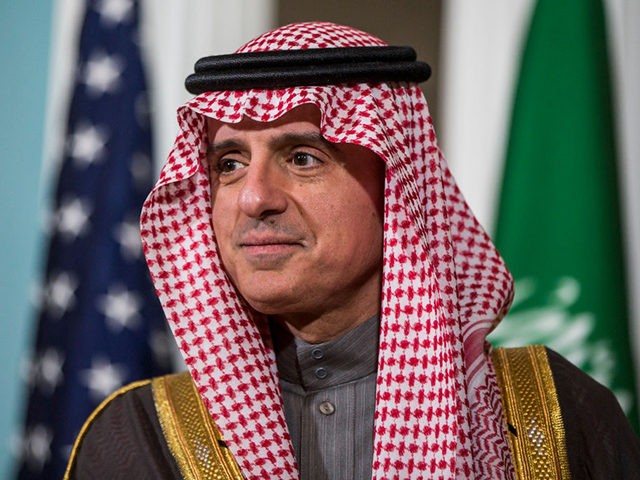The foreign minister of Saudi Arabia said in a recent interview surfacing this week that nuclear weapons development was “definitely an option” if neighboring rival Iran continued on its path to illegally build its own nuclear bombs.
Foreign Minister Adel al-Jubeir and Crown Prince Mohammed bin Salman have made similar statements in the past, emphasizing the need to contain the radical Islamist regime in control of Tehran. Riyadh had not raised the specter of developing its own weapons for some time, however, as President Donald Trump’s withdrawal from the 2015 Iranian nuclear deal and strict sanctions on the regime had impaired its ability to destabilize the region. The nuclear deal, signed by the administration of President Barack Obama and Vice President Joe Biden, resulted in Iran regaining access to billions of dollars in funds, triggering widespread terrorist activity in Syria, Iraq, Lebanon, and Yemen.
Al-Jubeir reportedly made the comments in an undated interview with the German outlet Deutsche Presse-Agentur (DPA).
Asked about Saudi Arabia developing nuclear weapons, al-Jubeir reportedly said, “it’s definitely an option … and Saudi Arabia has made it very clear, that it will do everything it can to protect its people and to protect its territories.”
According to al-Jazeera, al-Jubeir hinted that, in the event Iran announced that it possesses a nuclear weapon, Saudi Arabia would not be the only nation to rush to develop its own deterrent weapons.
Al-Jubeir also reportedly stated, “we believe the Iranians have only responded to pressure” and, asked about a potential Joe Biden presidency’s effect on regional politics, answered only, “we will have to see.”
Iranian regime leaders regularly threaten “the full annihilation and destruction” of the entirety of the nation of Israel, accusing it of being an illegitimate government because of its status as a Jewish nation. In 2019, four years after the Iranian nuclear deal was signed, the head of the Islamic Revolutionary Guard Corps (IRGC), General Hossein Salami, called destroying Israel an “achievable goal.” Similarly, Iranian rallies often feature the common chant “death to America” and disparaging remarks towards the Saudi government. Iran and Saudi Arabia are currently fighting each other through support for proxies in the Yemen civil war.
The 2015 nuclear deal, known formally as the Joint Comprehensive Plan of Action, required Iran to limit its nuclear development in exchange for major concessions, lifting sanctions on the regime. At the time, senior Obama officials admitted that Iran would likely use the money for terrorism. The deal also banned American nuclear inspectors from the sites where Iran claimed it would draw down its nuclear development. Trump withdrew from the deal following his election in 2016 and replaced the policy with “maximum pressure” via sanctions on the regime.
Iran has repeatedly violated the deal, continuing to develop nuclear material. In January 2020, it issued a statement that it would switch to formally and publicly violating the deal, not just doing so in secret.
As of November 2020, the United Nations watchdog International Atomic Energy Agency (IAEA) believes Iran possesses 12 times the amount of low-enriched uranium it is allowed to under the nuclear deal.
A Biden administration is expected to return to Obama-era Iran policies.
“I was part of that deal to get the nuclear agreement with Iran, bringing together the rest of the world, including some of the folks who aren’t friendly to us — and it was working. It was working, it [Iran] was being held tightly,” Biden claimed in a debate against fellow Democrats in January. “The next president has to be able to pull those folks back together, re-establish our alliances, and insist that Iran go back into the agreement, which I believe with the pressure applied as we put on before, we can get done.”
Iranian Foreign Minister Mohammad Javad Zarif said this month that he believes that Biden’s statements on Iran policy have been “more promising” for the regime than Trump’s.
Al-Jubeir, the Saudi foreign minister, made similar comments regarding potential Saudi nuclear development as those he made following the U.S. election this year when the Obama administration first announced the nuclear deal. Asked in 2016, this time by Reuters, if Saudi Arabia would see a nuclear weapon if Iran succeeded in building one, al-Jubeir said Riyadh would do “whatever we need to do in order to protect our people.”
A year later, reports began circulating that Saudi officials had begun building a nuclear energy program. Saudi officials stated only that they were shifting focus to the domestic production of uranium.
“Regarding the production of uranium in the kingdom, this is a program which is our first step towards self-sufficiency in producing nuclear fuel,” the Saudi official in charge of the atomic energy, Hashim bin Abdullah Yamani, said at an IAEA conference.
Crown Prince Mohammed bin Salman raised the issue again in an interview in 2018 with CBS News.
“Saudi Arabia does not want to acquire any nuclear bomb, but without a doubt, if Iran developed a nuclear bomb, we will follow suit as soon as possible,” bin Salman said, calling the Iranian government “very much like Hitler.”

COMMENTS
Please let us know if you're having issues with commenting.